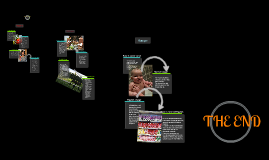Student Loan Presentation
Transcript: I'd like to discuss how we can better use or savings to tackle our student loans and better set ourselves up for the future. Student Loan plan August, 2017 How much do we owe? $55,034 Spread across 3* loans Loan Breakdown $8,000 AES - STEVE $11,105 AES - Molly $35,259 Great Lakes - Steve Student Loan Breakdown 15% Total: $53,034 21% 64% Deep Dive Total loan breakdown: Arranged from Highest to Lowest Balance How does this affect us? How does this affect us? Ramifications of carrying this much debt. Effects of carrying a large amount of debt. 1. It's expensive. We need to change the way we think about debt. 2. It sabotages our retirement. 4. It affects our credit. 5. It affects Junior. 3. It holds us hostage. It costs us an estimated $6 per day to carry this much debt. What we know now about compounding interest should change our thoughts on how we handle retirement savings. This affects us financially and emotionally. Not that we want to be taking out more loans, but should the need arise, this is an issue. AKA "Apollo", "RAM", "Bruce", "George", etc At our current rate of repayment, we will continue to pay $700 of our income towards our student loan debt for the next 10+ years(year 2027). Our current debt is $55,034. The amount we will pay back by paying only the minimum payment is $69,050. Continuing at our current rate of repayment will cost us $14,016 in interest. Attacking this debt is the smartest way for us to build for our future. Currently, we $700 of our income goes towards our student loan debt. The recommended amount to save for retirement is 15% of your income. The future value of $700, assuming 6% return, in 30 years(retirement age) is $4,020. Using the same figures above, putting $700 per month into a retirement account, instead of towards a student loan, could grow to be $703,000. Alternatively, if we wait 10 years to begin contributing, that same amount would only grow to $323,000. The $700 we pay in student loans each month is roughly %15 of our budget. Our budget is currently very tight. Removing this large expense sooner would allow for more wiggle room. We wouldn't have to scrimp to afford things like a gym membership, a bigger house, or a boat. Kids are expensive. Having less debt, sooner, can't do anything but ease things for us, and Junior. It would make saving for things easier. Imagine how quickly we could save for a down payment on a car, or a vacation, if we had $700 extra per month. Having a smaller monthly "nut" allows for less stress if times are tight. What else could we do with $700 per month? The Debt to Income Ratio(DTI) is one way that lenders measure the ability of a customer to pay back a loan. Carrying more debt can affect your ability to get a loan, and can increase the interest rates available to you. Carrying as much debt as we do affects our debt to income ratio Having more debt affects Junior. At our current rate of repayment, and based on my estimate of when he'll arrive, we'll be paying back our student loan debt until he's in 4th grade. That makes things harder, like: Shopping for clothes at places other than Carter's Going to summer camp Playing sports, or other extracurricular activities Saving for college It's not just our future. Proposed Plan of Attack Proposed Payoff Plan Plan of Attack Payoff Timeline 9/1/2017 - 11/2021 9/1/2017 9/1/2017 5/1/2019 11/2027 5/1/2019 Make a lump sum payment of $8,000 to close AES loan(STEVE). Total loan balance will decrease from $55,034 to $47,034. We use the $90 per month that was going toward the closed loan and apply it to AES loan(Molly). New payment amount will be $300, up from $180. Estimated date we will reach the $5,000 force out threshold on AES loan(Molly). Paying off this loan at this date will bring our total loan balance to $26,834. We use the $300 per month that was going toward the closed loan and apply it to the Great lakes loans, while specifically targeting those with higher interest rates. The new payment towards these loans will be $700, up from $421. 11/2021 Estimated date at which we will have reached the $5k force out threshold of our last loan. Paying this off will close all of our student loans. 6 years before our current projected payoff date. Year that Steve will be 47, Molly will be 44. This is when we are now scheduled to pay off our loans. Student Loan Debt Plan of Attack Debt vs Time - Proposed Plan Expected Results How this approach will benefit us. The Good News! The benefits of paying our loans off are sooner are substantial. Just by paying the one time, lump sum payment of $8,000 to close our lowest loan, we will save $3,500 and pay off our loans 16 months earlier. The benefits of paying our loans off are sooner are substantial. If we take it one step further, and then apply the $90 payment that was previously going to the $8,000 loan, we begin to see more benefits. Following the plan I've outlined would: Pay off our loans 6 years earlier We would repay a total of $59,000 instead of $69,050,

















